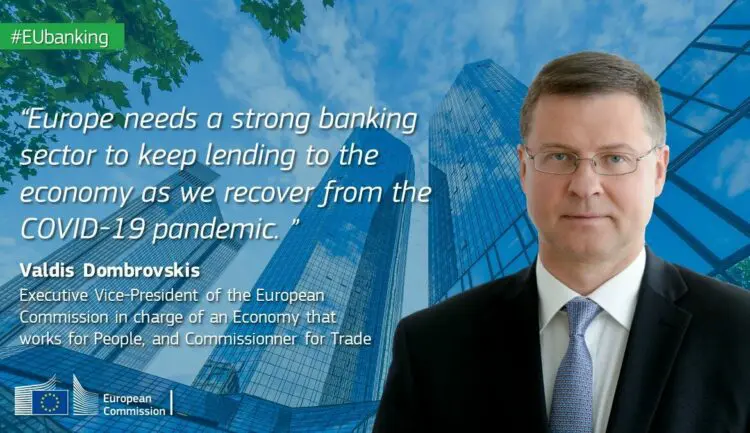Read-out from the College meeting and press remarks by Executive Vice-President Dombrovskis on the Banking Package 2021
Good morning ladies and gentlemen. Welcome to our College readout.
Today, we adopted our 2021 Banking Package, and Commissioner McGuinness and I will present it shortly.
The College also decided to register a European Citizens’ Initiative with the title ‘Call to Action – Environmental protection in all policies’.
The Spokesperson’s Service has published a press release where you can see more details.
The registration does not reflect an opinion by the Commission on this Initiative but it allows the organisers to start gathering the signatures required to continue the process.
[…]
And now let me present to you our main subject of the day: the Banking Package.
We learned a great deal from the last financial and economic crisis. It caused widespread disruption in global markets.
And it spread with ease into the EU banking sector too.
After a much-needed reform of the banking rules, the sector entered the COVID-19 crisis in a much better position.
Today, banks are better capitalised and stronger in terms of liquidity. Overall, they have coped well through the pandemic.
However, we have yet to address all the problems identified in the wake of the financial crisis.
Global finance needs global rules.
Globalised markets and financial systems do not allow anyone to exist in isolation. We need international standards to make the wider system more resilient and stable.
Today, we are proposing to finalise the post-crisis reforms of the banking regulation. These are based on the international standards adopted by the Basel Committee on Banking Supervision, known collectively as Basel III.
However, we are not starting from scratch.
We did a major overhaul of the bank, regulatory and supervisory framework.
In 2019, we carried out some significant reforms of the previous banking package. What is important now is to complete those reforms – this time focusing on how banks measure risks.
Inevitably, using international standards also means that European banks have less possibility to use certain tools such as internal models to calculate their capital requirements.
This is a consequence of one of the central pillars of the Basel III reform: what is known as the ‘output floor’.
Capital requirements calculated by internal models will not be allowed to fall below 72.5% of what they would be if the bank used standardised models.
It is designed to prevent any underestimation of risk and strengthen banks’ resilience to economic shocks.
Given that this places a burden on European banks in particular, we plan to phase in this threshold over a long period.
It is important that we take the specific features of the European banking sector into account to avoid a significant increase in overall capital requirements for the EU banks.
This is something that we have already stated in the discussions in the Basel Committee and this is what we are doing.
Mairead will give you more details on this.
I will briefly outline the other parts of today’s banking package: enforcement, sustainability and third-country branches.
On enforcement: we plan to give supervisors more powers to assess banking operations and to check that bank managers are properly suited for their tasks.
Then: as the EU economy transitions towards carbon neutrality, it is vital that banks can identify and manage sustainability risks and absorb financial losses that arise from them.
New rules will require banks to take environmental, social and governance risks into account when managing their business.
Lastly: we will introduce minimum standards to regulate and supervise third-country branches within the EU.
This will improve the protection of the financial stability in the EU banking sector.
We depend on a strong and stable banking sector to fund jobs and sustainable growth. It should adequately finance a social market economy that works for Europe‘s people and businesses.
As we saw during the latest crisis, banks continue to play a key role in our economy.
It has been crucial for them to be able to continue lending to households and businesses. And they are doing so.
As I have often said, during this crisis Europe’s banks are not part of the problem. They are part of the solution.
And we want to keep them strong, modern, viable and competitive. That is what today’s package is designed to achieve.
Thank you, and now I pass the floor to Mairead.







